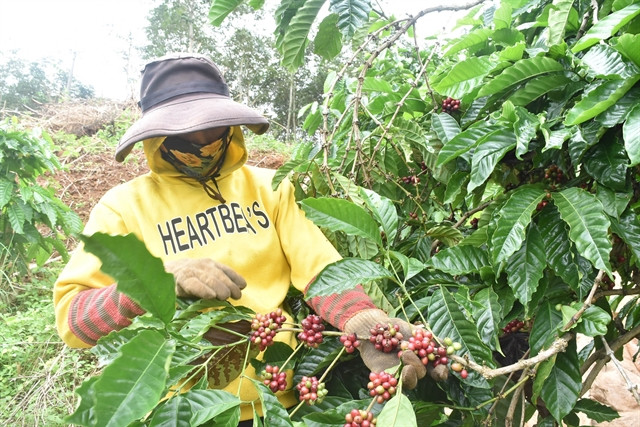 Coffee farmers in the Central Highlands region are turning to sustainable models to earn higher incomes. (Photo: VNA)
Coffee farmers in the Central Highlands region are turning to sustainable models to earn higher incomes. (Photo: VNA) Vietnam’s largestcoffee-growing region has around 639,000ha under the crop, or 92 percentof the country's total.
But productionthere is unsustainable and does not fetch high value due to its scattered and small scale.
A model thatcombines coffee farming with creating landscapes and ensuring high qualityhave been chosen by local farmers as solutions forincreasing the value of coffee.
More than 10years ago, Pham Van Thach, who has a 60ha plantation in Dak Nong province’s GiaNghia city, decided to switch to the landscape model.
“It alsooffers my family higher productivity and income compared to growingonly coffee,” he said.
His coffeegarden has three layers, the top comprising fruit and shade trees to regulatetemperatures, the middle for growing coffee and the lowest being a grassmeadow.
It meetsorganic production standards in the absence of use of drugs and plantprotection fertilizers.
Thach usesmicro-organisms, manure from goats and cows and coffee husk to make fertilisers.
He is alsofounder of the Dak Nong Organic Agriculture Cooperative that specialises in thecoffee landscape model. It has around 100 members.
Their coffeeoutput and quality are guaranteed and in return they get paid 30 - 50 percentmore than market prices.
“Members ofthe cooperative have a more stable income compared to traditional coffeeproduction,” Thach said.
Ho Gam, Chairmanof the province’s Farmers Association, said the landscape coffee model wasopening new avenues for local coffee production and has yielded good results sofar.
“This model isreplicated in other localities to ensure sustainable coffee development,”he said.
Meanwhile, DakLak province is focusing on all of economic, social and environmentalsustainability.
The provincialDepartment of Agriculture and Rural Development will continue to review thesustainable coffee project, giving priority to developing high-quality,competitive and high-value-added products.
The provincewill focus on developing coffee products on an area of 107,000ha with theobtained certificate of geographical indication for the ‘Buon MaThuot Coffee’ trademark.
It will givepriority to promote coordination with the Sustainable Trade Initiative andrelevant units which are carrying out the landscape coffee project on an areaof 90,000ha.
Its firstphase has been launched on an area of 5,200ha in Krong Nang district.
Phan Viet Ha, DeputyDirector of the Ministry of Agriculture and Rural Development’s CentralHighlands Agro-Forestry Science and Technology Institute, said relevantagencies needed to restructure coffee productionareas to diversify products and increase value, promoting organic andother quality standards.
Coffee farmersneeded to embrace technology, and grow new varieties with high quality andproductivity, he said.
They shouldlimit the use of pesticides and tie up with businesses to build brands fortheir coffee./.





























